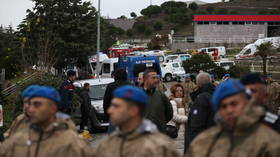At least one Omicron death in UK confirmed

The new Omicron strain has claimed its first victim in the UK, Prime Minister Boris Johnson confirmed during a visit to a vaccination clinic in West London.
Johnson made the announcement on Monday, saying, “Omicron is producing hospitalizations and, sadly, at least one patient has been confirmed to have died,” as quoted by the British media.
The premier called on people not to write off Omicron as a “milder version of the virus,” pointing to the “sheer pace at which it accelerates through the population.”
The takeaway message from Johnson’s statement was that a booster dose of Covid vaccine could minimize the risk of infection or, failing that, at least render the symptoms less dangerous.
On Sunday, the prime minister had warned people in the UK that there was a “tidal wave of Omicron coming.” He had also set a new deadline: that, by the end of December, boosters would be available for all those willing to get additional protection from the virus.
A total of 3,137 Omicron cases have been detected in the UK to date, according to Sky News. However, most of those patients are being treated at home, with only 10 of them currently hospitalized in England, Health Secretary Sajid Javid revealed on Monday.
Amid the rapid spread of the new strain, the British government made the decision on Sunday to move the nationwide Covid alert level from 3 to 4, which indicates that “transmission is high, and direct Covid-19 pressure on healthcare services is widespread and substantial or rising.”
Omicron was first reported in South Africa on November 24, with the World Health Organization raising the alarm over the new strain’s extensive mutations, which have the potential to make it more contagious or deadly. The news triggered a panicked reaction, with European nations imposing travel bans on South Africa and several other countries on the continent.
However, that did not stop Omicron making landfall in Europe, with the first case being detected in Belgium on November 27. Shortly afterwards, the mutated virus was identified in most other European nations, including the UK, as well as in the US, Russia, Japan, and other countries across the world.
The jury is still out on whether Omicron is more deadly than its predecessors, and how existing vaccines are likely to fare against the new strain.












